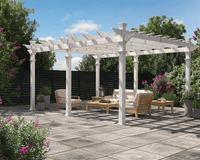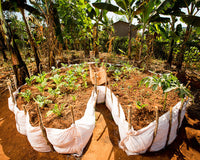Composting is one of the most natural ways to nurture your garden. Some people believe it is time-consuming and smelly, but that isn't necessarily true! So let’s demystify composting for newbies because anyone and everyone can start composting!
Composting is all about making something nutritious from materials that you would normally throw away. Organic materials (e.g. food scraps from the kitchen) are recycled to create compost, technically called 'humus' an essential and rich top layer in your soil. Living microbes break down organic matter into smaller and smaller pieces through composting until it becomes easily available to plants for absorption through their roots. With this "black gold" magic, all plants can flourish!
Fun fact: Compost has been nicknamed “black gold” for its rich color and super valuable nutrition!
Creating compost is like making beer: you need bacteria, air, moisture, and heat to break down the compost ingredients (your kitchen waste). In order to begin any of the below methods, you will need three main materials: Wets (food waste), Greens (nitrogen-rich materials), and Browns (carbon-rich materials). To learn more about layering and identifying material for these three elements, take a look here. By the time the process is complete, your compost pile should smell like good soil and be slightly sweet. You’ll know it’s finished when it has a black and crumbly cake-like texture. Yum, black forest cake anyone?
Fun fact: When compost is added to sandy soil, it will retain more water, while compost added to clay soil will help it shed excess water more quickly. Organic matter, therefore, can improve water retention in any soil conditions.
There are a number of ways and methods for composting, but we will be digging into passive composting and hot composting. Most of us have seen a hot composting bin, it is usually a plastic structure with lid to keep in heat. Maintaining a certain temperature is crucial for this method as it is more complex, requires shredded materials, watering, and turning… But let me tell you, hot composting is fast! With proper maintenance you can have ready-to-go compost in 2-4 months.
The opposite is passive composting, otherwise known as cold composting. It requires an easy-to-manage compost pile (typically 1 cubic meter) and there's no need to water or turn it constantly. You can simply pile and let nature do its thing! With this technique you will get more beneficial insects like earth worms living in your product. The timing of passive composting is crucial since decomposition takes about a year. Generally, fall-made compost piles are not ready until the following summer, while spring-made piles are ready by the end of the summer.
Quick Tip: The best way to minimize back and forth from your kitchen to compost system is to keep a crock or pot on the counter and dump it every couple of days (unless you're in the garden every day- which is very possible!).
Whatever way you choose to compost remember that it isn't about being perfect, but rather about taking small steps towards a more sustainable future.
Until next time,
Katie



